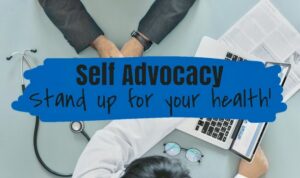
If you have been diagnosed with a rare disease I’m sure that at some point you have met a nurse or doctor who has never heard of your condition. Some flat out say “what’s that?!” Some side eye you while they quickly google it on their phone. One nurse said to me once “Wow! If this was a teaching hospital everyone would want to come to see you.” Gee thanks. Way to make a girl feel special. Now I don’t blame them for this. Doctors and nurses have a very stressful and essential job and we would be lost without them. But they are human. And no one can be an expert in every condition or disease that exists. It’s impossible.
Which is why it’s a good idea to be an active member of your health care team and advocate for yourself to ensure your needs are being met.
Seven Ways to be an Active Member of Your Health Care Team
- Don’t take no for an answer! This is particularly important when you are searching for an elusive diagnosis. Don’t let them push you away or try to tell you that your symptoms are all in your head because they can’t figure you out. Trust your instincts. If you know something is wrong, go back again and again until they take you seriously. Get a second opinion. Don’t give up!
- Seek out experts. Once you have that diagnosis, do some research. Find the best specialists near you and ask to be referred to them. Ask your doctors, hit the internet, join a support group and reach out to others who have your disease. Ask around and find the experts! They are the ones you should put your trust in.
- Educate yourself. Don’t just go crazy with Google, as information in the public domain may be outdated. Ask your doctor for reputable sources of information. Join a support group, find others like you and learn from them. You can gain a wealth of knowledge from people who are living with your disease. Educating yourself is an important part of your healthcare.
- Ask questions! Why do I need this medication? What are the side effects? What do we do if I get those side effects? What happens if I don’t take this medication? Go through the risks and benefits of medications and treatments with your doctors. Don’t be afraid to ask questions. Your doctors want you to make informed decisions.
- Ask your expert before taking any medications or supplements. If you end up in the emergency room or a walk-in clinic, if time permits, run any suggestions for medications by your expert. Doctors who don’t have extensive knowledge of your rare disease may not know all of the potential complications and interactions. And don’t take any type of supplement or over the counter medication without first getting approval from your specialists. I love natural medicine, but it needs to be treated with the same respect and caution as any other medication. Natural does not equal safe.
- Organize your info and carry it with you. It can advocate for you if you’re not able to. I have a little folder which contains my official diagnosis report, a list of treatments I’ve had, a list of current medications, and the names and numbers of all my specialists. It comes along if I have to head to the emergency room.
- Speak up if you are suffering. I think sometimes we push through our suffering assuming that it’s just part of the process. But it may be as simple as adjusting the dosage or adding in another medication. So, if you are having a new or worsening symptom or a side effect from a medication, let your health care team know. There may be something they can do to help.
You are the most important member of your health care team. So, speak up when something is wrong, ask questions, learn as much as you can, and find the specialists that you can put your trust in. Self-advocacy can be a powerful force in your health care journey.
Lori Grover is a guest blogger for Mackenzie’s Mission. She was diagnosed with AL Amyloidosis in 2016 and writes to share experiences and lessons learned during her journey. More wonderful blogs by Lori can be found on her page Amyloid Assassin. When not writing, she is mostly a stay at home mom, florist, crafter, lover of books and food.